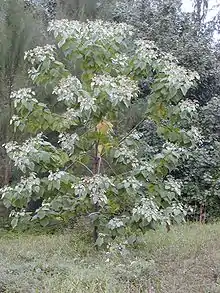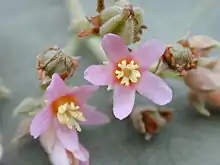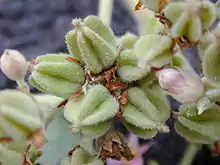| Melochia umbellata | |
|---|---|
 | |
| Scientific classification | |
| Kingdom: | Plantae |
| Clade: | Tracheophytes |
| Clade: | Angiosperms |
| Clade: | Eudicots |
| Clade: | Rosids |
| Order: | Malvales |
| Family: | Malvaceae |
| Genus: | Melochia |
| Species: | M. umbellata |
| Binomial name | |
| Melochia umbellata | |
| Synonyms | |
| |
Melochia umbellata is a species of flowering plant in the mallow family, Malvaceae. Its specific epithet comes from the Latin umbellatus (umbel-like), referring to the inflorescence.[2]
Description


Melochia umbellata is a shrub or small tree, growing to 2–15 m in height. It grows rapidly and is able to colonise disturbed land.[3] It has large, broadly ovate, leaves 90–300 mm long. The flowers are usually pale pink to red. The seeds are winged and wind-dispersed.[3]
Distribution and habitat
The plant is native to a region extending from India eastwards through Southeast Asia to north-western Australia and New Guinea. It occurs in secondary vegetation and forest clearings, on rocky slopes and along the edges of rivers and forests, often in seasonally dry soil.[2]
It has been introduced elsewhere and is cultivated widely to provide shade for young trees in timber and coffee plantations. Melochia is relished by ruminants when offered as a cut-and-carry feed.[4] It has become an invasive weed on the Island of Hawaiʻi where it was extensively planted in the Hilo area during a 1920s reforestation program.[3]
References
Notes
- ↑ "Melochia umbellata". Germplasm Resources Information Network. Agricultural Research Service, United States Department of Agriculture. Retrieved 2010-12-08.
- 1 2 Flora of Australia Online.
- 1 2 3 Starr et al. (2003).
- ↑ Pers.comm.
Sources
- Starr, Forest; Starr, Kim; & Loope, Lloyd (March 2003). "Melochia umbellata" (PDF). United States Geological Survey. Retrieved 2010-11-30.
{{cite web}}: CS1 maint: multiple names: authors list (link) - "Melochia umbellata (Houtt.) Stapf". Flora of Australia Online. Australian Biological Resources Study. 1993. Retrieved 2010-12-01.
External links
![]() Media related to Melochia umbellata at Wikimedia Commons
Media related to Melochia umbellata at Wikimedia Commons
![]() Data related to Melochia umbellata at Wikispecies
Data related to Melochia umbellata at Wikispecies